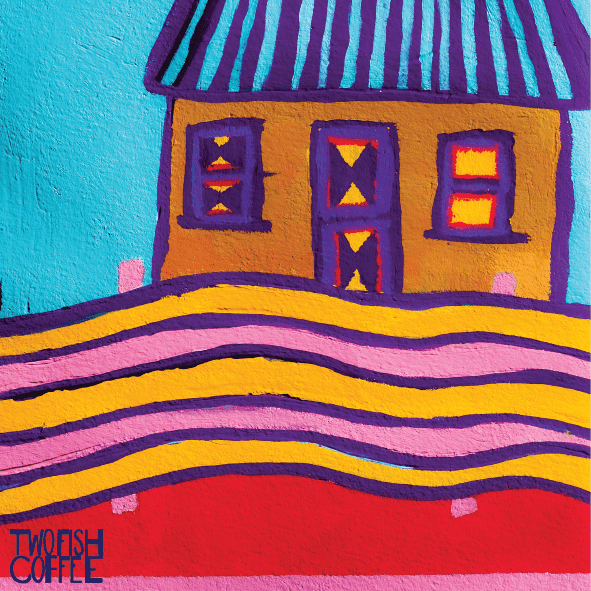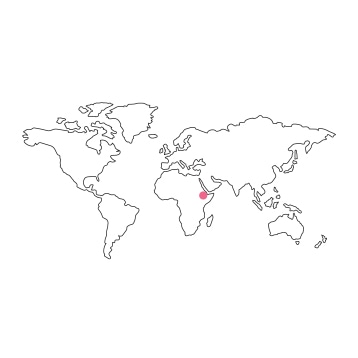Country: ETHIOPIA
State: Southern Nationalities, Nations, and People’s Region
Region: Sidamo, Guji
Woreda: Shakisso
Kebele: Hadeso
Coffee Growing Zone: South East
Owner: Faysel A. Yonis
Farmers: 850 small producers
Altitude: 1,800-1,950m above sea level
Variety: Bourbon, Typica, Heirloom varieties
Processing: Washed
Lime-like acidity, with apple, pear, orange and apricot. Transparent, juicy, floral and clean.
ABOUT HADESO (with thanks to Melbourne Coffee Merchants)
Hadeso (pronounced “Had-ess-o”) is a privately-owned washing station that is located in the Shakisso ‘woreda’ (administrative district) in the Guji locality in Ethiopia’s renowned coffee region, Sidamo, in the south-east of the country. It is named after the ‘kebele’ (local village) of Hadeso. The washing station is one of ten owned and managed by Testi Coffee, a family-owned company founded by Mr Faysel A. Yonis. Hadeso produces exceptional washed and natural processed lots.
Coffee is delivered daily to Hadeso by around 850 small local coffee growers. The majority of these families farm organically on tiny plots of land, which average just 2–5 hectares in size. Coffee is their main cash crop and grows alongside food crops of corn, grain and bananas, under the shade of native Birbira, Wanza, and Acacia trees. The average elevation of the farms in this region is very high – around 1,900–2,050m above sea level – and this, combined region’s cool temperatures, is ideal for the slow ripening of coffee cherries, leading to denser beans and a sweeter, more complex cup profile.
This coffee lot was produced as part of Testi’s quality improvement initiative, Premium Cherry Selection (PCS). Launched in 2018, the Premium Cherry Selection program ensures that best practices are used for growing, harvesting and processing the coffee cherry. Through the program, Testi pay a premium to farmers who pick and deliver only the ripest cherries from their farms. Coffees produced as part of the program represent the highest quality and cleanest cup profile available from the washing station and wider region.
ABOUT TESTI COFFEE
Testi Coffee was established in 2009 by Mr Faysel A. Yonis as a coffee exporting company. Testi’s objective is to build long term relationships with buyers and growers by producing exceptional coffees and establishing transparent business practices. Today, the company owns ten washing stations – located in Guji, West Arsi, Sidama and Yirgacheffe – which are operated with meticulous attention to sorting, screening and processing, with the goal of achieving the highest coffee quality. The company aims to secure high prices for their coffees, which allows them to pay fair and sustainable prices to the growers who deliver cherries to their washing stations.
Testi’s business model is to buy coffee cherry from local ‘out-growers’ (an Ethiopian term for a smallholder farmer who contributes to a particular washing station) to be processed at their own washing stations, as well as coffee in parchment from partner washing stations. The company is committed to maximising the potential and profitability of Ethiopian coffees and works closely with their producing farmers and washing station partners to improve the quality and yields of the coffee at farm level and in processing.
The company’s philosophy revolves around supporting and growing with the farming communities that produce their coffee. Mr Faysel strongly believes that increased rewards for the out-growers should be shared with, and benefit, the entire community. In pursuit of this goal, Testi has launched a social program called Project Direct, which focuses on directly supporting coffee farmers and their families in tangible and positive ways. Project Direct initiatives are funded by Testi and are designed to motivate and empower farming communities, develop social conditions and improve livelihoods. To date, Project Direct has built a primary school in both Aricha and Guji, where they fund all school supplies and provide financial support and scholarships to top performing students. The project has also helped communities’ access clean water and electricity in the remote areas around their washing stations. Beyond providing increased opportunities, such initiatives contribute to improved safety, healthcare and productivity at the farm level.
ABOUT THE GUJI REGION
The Guji zone was established as a unique production area in 2002. It is located in the Southern portion of Sidamo and is named after the Oromo people: a tribe with a long, proud history in coffee production.
Coffees from Guji were previously classified as ‘Sidamo’ (a very wide geographical classification encompassing much of central-south Ethiopia), however more recently they have been separated from this classification and recognised for their unique and distinctive cup profiles. This distinctiveness is driven by the unique combination of elements in this production area, including high altitudes, rich, fertile soil, and exceptional heirloom varieties.
Guji is bordered on the south and west by Borena, on the north by Gedeo and Sidama, and on the east by Bale and the Somali Region. Coffees that are classified as ‘Gujis’, originate from the ‘woreda’ (administrative regions) of Adoola Redi, Uraga, Kercha, Bule Hora, and Shakisso, which is where this lot is from.
Most communities in the region still live rurally and make a living from farming. Coffee remains the major cash crop for most families in the Guji region, who grow coffee alongside food for consumption.
ABOUT THE SIDAMO ZONE
Sidamo is a wide geographical classification that encompasses much of central-south Ethiopia and includes renowned coffee producing localities such as Yirgacheffe, Kochere, West Arsi, Bensa and Guji. Sidamo is located in Ethiopia’s South East Coffee Zone, extending across the states of Southern Oromia and the Southern Nations, Nationalities, and People’s Region (SNNPR), one of nine ethnically based regional states of Ethiopia. The Sidamo zone is named for the Sidama people; a tribe with a long and proud history of coffee production. After a 2019 Referendum, the zone is currently awaiting separation from the SNNPR and transformation into an autonomous Sidamo Region.
Sidamo is a renowned coffee area and produces exceptional natural and washed coffees that showcase an extremely diverse range of flavour profiles. Coffees from Sidamo are noted for their intensely fruit-forward, tea-like, floral and complex character and are sought after worldwide. It is widely accepted that the coffee species, Arabica, originated in the lush forests of southern forests of Ethiopia and hence growing conditions in this area are perfectly suited for producing exquisite coffees.
Coffee has been cultivated in the Sidamo Zone for centuries and is an important source of income for rural households, who grow it as the primary cash crop. Family plots are small and intensively farmed with intercropped coffee, food crops like pulses, grain and yams, and other cash crops like khat (similar to tobacco) and Ethiopian banana. Most farms are planted amongst or alongside indigenous forest trees, which provide a thick canopy of shade for the coffee trees. Historically, farmers in this area will use organic farming practices (although it is unlikely to be certified) as there is no ready access to artificial fertilisers or pesticides.
VARIETY
This coffee is a mix of varieties that we refer to as “heirloom varieties”. This is a term that is all-encompassing and used by many actors in the coffee industry to generally categorize Ethiopian coffee varieties that are from native forest origins. Whilst this describes many of the varieties found in Ethiopia, it is also a bit simplistic and does not recognise varieties that have been specifically developed and widely distributed by the Jimma Agricultural Research Centre (JARC) or locally recognised and cultivated varieties.
JARC varieties are developed for disease and pest resistance, rather than cup profile, and are released by number. For example, 74110, 74112 and 74116 are all widely propagated in the Sidamo growing region. There are also native or “landrace” varieties in the region that were originally selected from the forest and have been propagated in the Sidamo region for decades. There are five popular ones that all have been named after indigenous trees in the area—they are Bedessa, Kudhumi, Mique, Sawe and Walichu. There is little documentation on the history of these varieties, and it is hard to know if they represent single varieties or a wider group of varieties, however, it is widely accepted that they play a major role in the quality of the coffee from this region, with a distinctive floral and citric cup profile.
PROCESSING
This coffee has been processed using the washed method, using fresh, clean water. It is classified as Grade 1, the highest quality classification for Ethiopian coffees, indicating a great deal of effort has been put into the selection and grading during processing.
Each day, carefully hand-picked coffee cherries are delivered to the Hadeso washing station and are meticulously sorted by hand and in a floatation tank prior to processing to remove unripe, overripe, or damaged fruit, in order to enhance the quality and sweetness of the cup.
After sorting, the coffee cherries are then pulped to remove the fruit and skin and graded by weight; heavier beans are of superior quality and deliver a sweeter cup. After grading, the parchment-covered coffee is soaked in tanks of clean water for 36–48 hours to remove the mucilage (sticky fruit pulp) by allowing it to ferment and detach from the coffee.
The coffee is then re-washed and graded again by density in washing channels and soaked in clean water for 12 hours.
The coffee is then dried for 10–12 days on raised African drying beds, firstly under cover (for around 3–5 hours) and then subsequently in the sun. Whilst drying, the coffee is carefully hand-sorted, and any defects are removed. It is also turned regularly to ensure that it dries evenly and consistently. At midday, the coffee is covered to protect it from full sun. It is also covered overnight to prevent damage from morning dew. Once the coffee is dry and has reached its desired humidity, it is rested in parchment until it is ready for milling and export.
WHY WE LOVE IT
The word “testi” means happiness in the Harrari language, which is fitting as their coffees make us very happy! Hadeso showcases the distinctiveness and exceptional potential of coffees from the Guji region.

